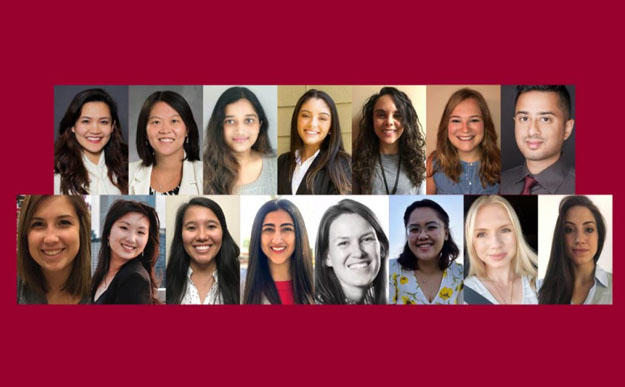Dentistry students engage in interprofessional collaboration through OACA internship

Two School of Dentistry students are members of the first Interprofessional Education Intern cohort through the Office of Academic Clinical Affairs.
Kaushik Mikherjee, MSc, PhD, DDS ’22, and Trang Nguyen, DDS, PhD, UMN PASS join thirteen other health sciences students as inaugural interns. The students seek to solve interprofessional problems together, gain skills in leadership and communication, gain knowledge across disciplines, and integrate research.
Their objectives are to “learn and lead together, solve problems for clinical partners, develop real-world working relationships, and advance interprofessional education and practice,” according to the Office of Academic Clinical Affairs website.
In addition to the two School of Dentistry students, the fifteen interns include five from the School of Public Health, five from the School of Nursing, and one each from the College of Veterinary Medicine, Center for Allied Health Programs, and College of Liberal Arts.
Each student works with a team of two to three fellow interns on an interprofessional project to improve some aspect of practice and education. Nguyen’s project consists of developing student-driven interprofessional experiences within Greater Minnesota, using virtual technology to provide a toolkit and structure for students interested in being part of interprofessional experiences, in partnership with the Office of Academic Clinical Affairs. Mukherjee’s team works with the Community-University Health Care Center to improve interprofessional practice care models, bringing clinics together to study how data, practice, and education can be improved.
This isn’t the first time either student has worked in research and healthcare professional spaces. Nguyen, who received her doctorate in Asia before moving to the United States in 2018, has conducted research at several academic institutions. She looks forward to a day where she can fulfill her dream of creating a platform for evidence-based resources that clinicians from various clinical areas can access.
Mukherjee worked for an interdisciplinary team at USC, focusing on tooth enamel regeneration before he came to the University of Minnesota. His volunteer experience in Los Angeles and his previous work encouraged him to focus on translational research that improves community oral health outcomes.
In addition to their projects, the interns experience monthly fireside chats with surprise guests whose experience working across health sectors gives them insight into interprofessional work. So far, they’ve had a conversation with Michael Osterholm, PhD, and John Finnegan, PhD, on COVID-19 response, and another with Dean Connie White Delaney, Vice President Maria Raines, and Representative Kaohly Vang Her on leadership throughout the pandemic.
Though it’s only been a few months, Mukherjee says he’s been impressed with the program and is excited to make interprofessional change. “This was really a unique opportunity for me to step outside the rigors of a structured curriculum and open myself to the real-world health-related problems experienced in the community by engaging with students from various disciplines,” he said. “It has been incredibly refreshing to work alongside other members in the healthcare community and engage in dialogues to improve the quality of patient care.”
Mukherjee has already learned quite a bit about the intersections of various healthcare sectors. “What’s stuck out so far is how uniquely we perceive challenges in healthcare through different lenses, and how team exercises can yield novel solutions to challenging tribulations.”
As he looks to his future as an oral health professional, Mukherjee knows how important interprofessional education will be for his patients.
“By combining our different skills, experiences, and backgrounds, interprofessional training helps us meet the needs of our diverse patient population more equitably,” he said. “This will give me a broader understanding about age, gender, and race-related health inequities that present barriers in our profession. This will raise my self-awareness and my empathy.”